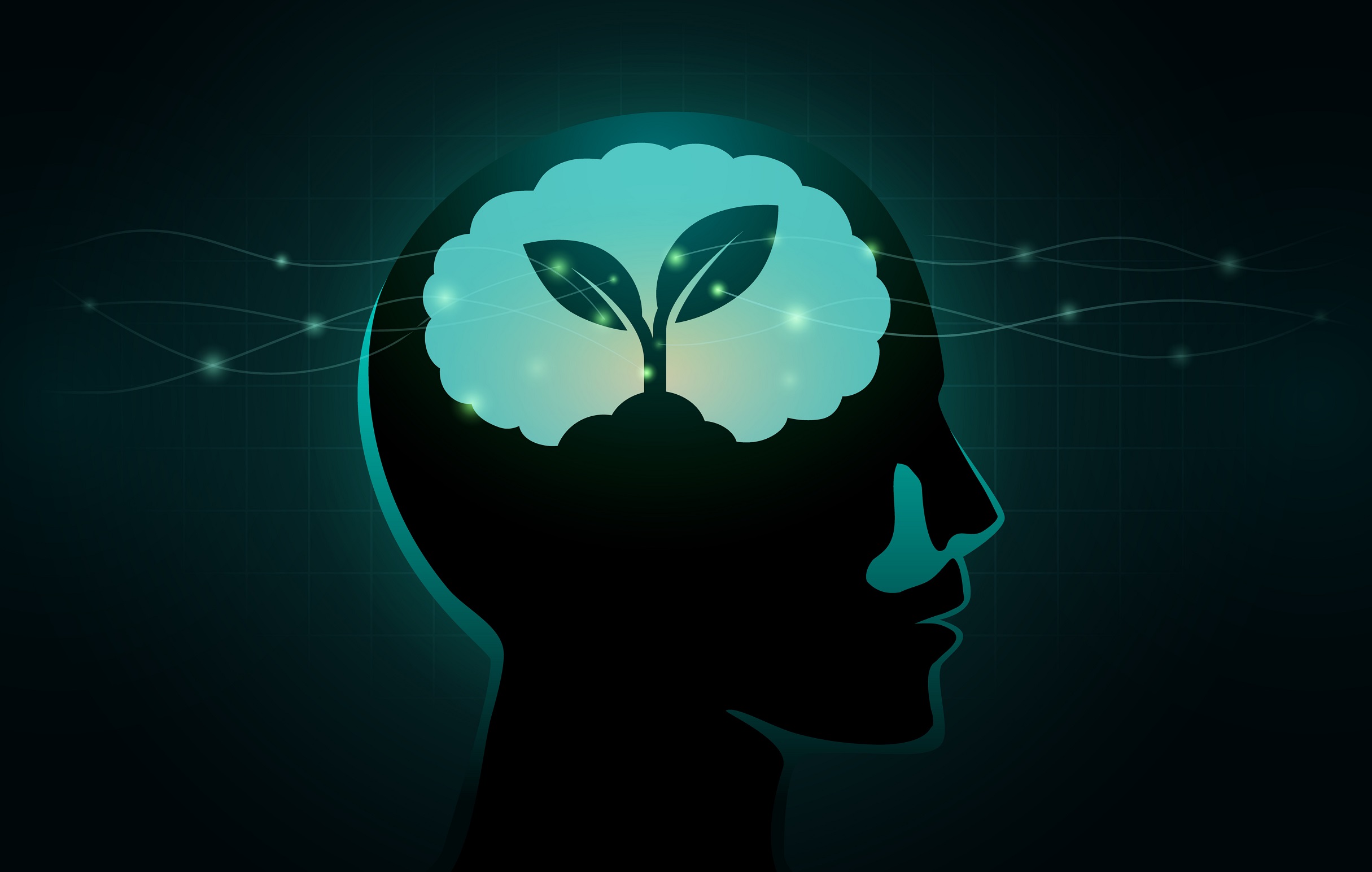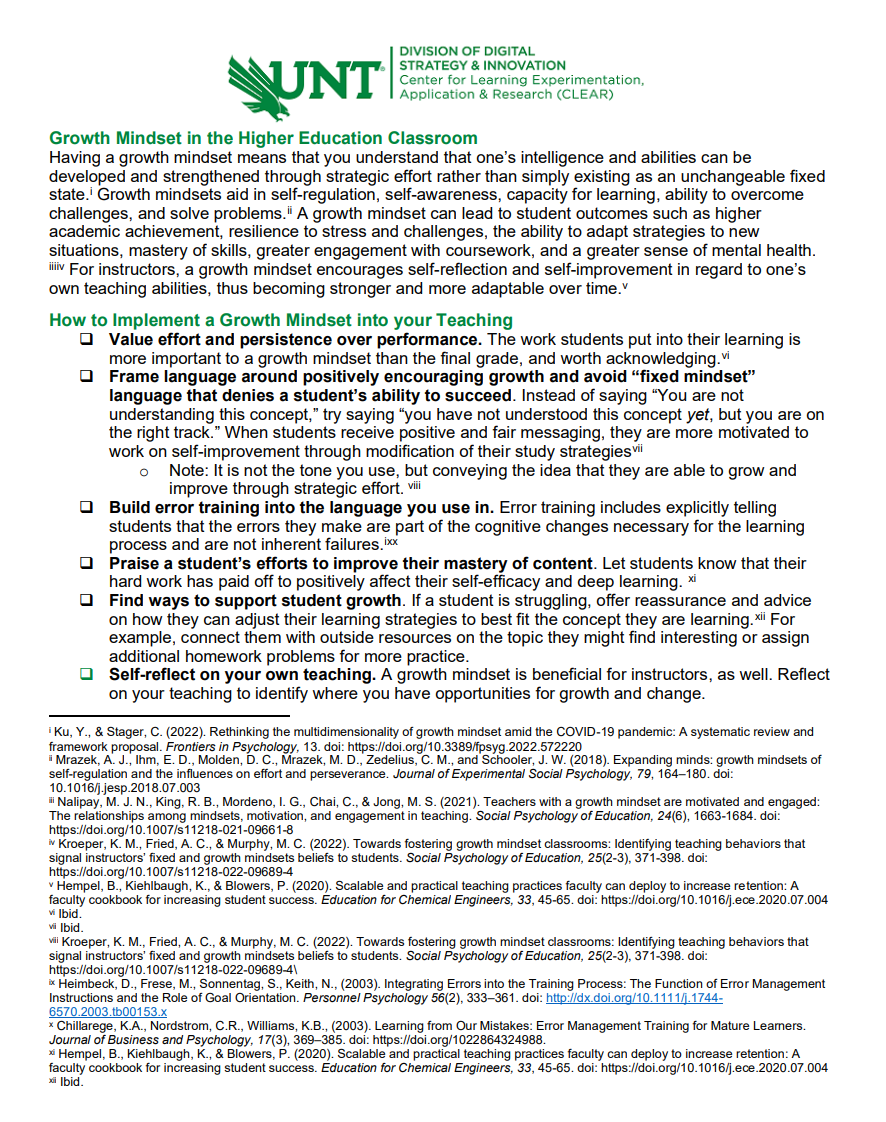Growth Mindset in the Higher Education Classroom
- DSI CLEAR
- Teaching Resources
- Theory & Practice
- Methods for Continuous Improvement
- Using AI in the Higher Education Classroom
- Invisible Labor and Faculty Retention Since COVID-19
- Inclusive Discussions
- Inclusive Assessment
- Designing Assessments for Academic Integrity
- Inclusive Instructional Strategies
- Instructor Presence in the Online Classroom
- Tips for Providing Personalized Feedback to Students
- Course Design for Student Retention
- UNT's CLAW 3 Active Learning Classroom Instructional Guide
- UNT Faculty Teaching & Learning Resource Guide
- Growth Mindset in the Higher Education Classroom
- Course Outcomes & Objectives
- Multimedia Course Design for Student Engagement and Retention
- Level Up Learning With Portfolios
- Group Work in Higher Education: Benefits & Practices for Success
- Open Educational Resources & Copyright Essentials for Instructors
- Evaluating OER Resources
- Accessibility Online
- Copyright Guide
- Online Teaching
- UNT Syllabus Template
- Teaching Consultation Request
- Open Educational Resources & Copyright Essentials for Instructors
- Evaluating OER Resources
Growth Mindset in the Higher Education Classroom

Having a growth mindset means to understand that one's intelligence and abilities can be developed and strengthened rather than existing in a fixed state (Ku & Stager, 2022). Instructors can incorporate growth mindset into teaching through the strategies described below to support students' long-term intellectual growth and self-efficacy (Ku & Stager, 2022). Growth mindsets aid in developing self-regulation, self-awareness, capacity for learning, ability to overcome challenges, and problem solve (Mrazek et al., 2018).
Why is having a Growth Mindset Important?
Students who can internalize a growth mindset are better able to fulfill long-term learning goals rather than just “make the grade” (Stump et al., 2014) Further, employing a growth mindset in teaching has been shown to increase student retention (Hempel, Kiehlbaugh & Blowers, 2022, p. 45). With a growth mindset, students can take initiative in their own learning over time and build their self-efficacy. As they grow as academics and professionals, they will be better equipped to approach challenges as manageable opportunities for growth.
On the other hand, with a fixed mindset in which people are seen as having an unchanging level of intelligence, ability and capacity for learning, academic performance actually decreases – especially in marginalized student bodies such as among Black, Latino, and Indigenous students (Ku & Stager, 2022). Promoting a growth mindset over a fixed mindset can empower students of all backgrounds and abilities to value learning and their own intellectual development. The following table depicts the differences between how a growth mindset and a fixed mindset shapes student experience:
Comparison between growth and fixed mindset in students.
| Growth Mindset | Fixed Mindset |
| Higher academic achievement (Nalipay et al., 2021). | Lower academic performance (Nalipay et al., 2021). |
| More resilient to stress (Nalipay et al., 2021). | Less resilient to stress (Nalipay et al., 2021). |
| Greater mental health (Nalipay et al., 2021). | Worse mental and physical health (Nalipay et al., 2021). |
| More engaged with coursework (Nalipay et al., 2021). | Decreased life satisfaction (Nalipay et al., 2021). |
| Strategies to regulate emotions and adapt to challenges (Nalipay et al., 2021). | Pursue performance goals such as making a grade (Nalipay et al., 2021). |
| Using strategies to improve and master skills (Nalipay et al., 2021). | Sees exuding more effort as having less actual ability (Nalipay et al., 2021). |
| Better equipped to respond to life’s challenges (Kroeper et al., 2022). | Feel helpless in ability to modify learning strategies (Kroeper et al., 2022). |
The disparity in outcomes between students with a growth or fixed mindset may stem with the fact that a growth mindset relies on problem solving and pursuit of specific learning goals. Students with a fixed mindset may think it is impossible to improve. Therefore, if they failed at something, they would continue to fail at it, which in turn gets internalized and becomes a hindrance to one’s self-efficacy (Kroeper et al., 2022).
How do you Adopt and Implement a Growth Mindset in your Teaching?
Once you understand the benefits adopting a growth mindset can have for students, we can examine how a growth mindset benefits you as an instructor. Below are some strategies instructors can utilize to integrate a growth mindset into their teaching:
- Value effort and persistence over performance alone. A growth mindset emphasizes the work students put behind achieving their goals; therefore, regardless of the outcome, it is important to acknowledge the work that the student did to learn (Hempel et al., 2020).
- Frame language in a way that positively encourages growth. For example, Instead of saying “You are not understanding this concept,” say “You have not understood this concept yet.” Using words like “yet” let students know that they have potential to learn the material and grow from the point where they are at (Hempel et al., 2020).
- Avoid language that reflects a fixed mindset and denies students the ability to succeed. For example, do not say “half of you will fail this exam.” Instead, say “This is a difficult exam, but I know everyone is is able to master the material with hard work and strategy.” When students receive positive and fair messaging, they are more motivated to work on self-improvement through modifying their study strategies (Hempel et al., 2020).
- Build error training into the language you use in class. In the classroom, error training looks like telling students in explicit terms that the errors they make lead to the cognitive changes that contribute the learning process and are not inherent failures (Heimbeck et al., 2003; Chillarege et al., 2003).
- Provide praise when a student’s efforts improve their mastery of content. Receiving confirmation that their effort had a positive outcome increases their self-efficacy, deep learning and improvement of metacognitive learning strategies. Further, acknowledging the effort students put into learning will communicate that their hard work pays off (Hempel et al., 2020).
- Self-reflect on your own teaching. A growth mindset is not only beneficial for students. Instructors always have room to grow and improve just like the students they teach, so reflect on your teaching and identify where you have opportunities for growth and change (Hempel et al., 2020).
- Find ways to support student growth. If a student is struggling, offer reassurance and advice on how they can adjust their learning strategies to be more suited to the concept they are struggling with (Hempel et al., 2020). For example, if a student is struggling to understand a math concept, reassure them that the concept is difficult for many people and connect them with outside resources they can utilize and offer additional practice problems for them to do. Finish by letting them know that they are capable of understanding the concept.
According to Kroeper et al. (2022), there is a misconception that a growth mindset is simply all positive remarks directed at students and a fixed mindset is all negative remarks directed at students, whereas more specifically, a professor can be warm and kind while still communicating to a student (using a fixed mindset) that they cannot improve. For example, “It’s okay if you’re not good at math, some people just aren’t.” Or, a professor can be harsh while communicating using a growth mindset by saying something like “You didn’t do well on this test because you are lazy and didn’t work hard enough.” It is not the tone with which the message is delivered, or the kindness it is delivered with, but the messaging that a student can (growth mindset) improve or cannot (fixed mindset) improve.
Conclusion
Adopting a growth mindset as an instructor, and implementing one into your classes, promotes a healthy relationship with learning and building one’s confidence in themselves to overcome obstacles such as difficult class content. An instructor can promote a growth mindset to their students by acknowledging the effort they put into their work, providing constructive feedback and advice to foster better learning strategies, and emphasizing through their language that students always have the ability to learn and grow.
References
Chillarege, K.A., Nordstrom, C.R., Williams, K.B., (2003). Learning from Our Mistakes: Error Management Training for Mature Learners. Journal of Business and Psychology, 17(3), 369–385. doi: https://doi.org/10.1023/A:1022864324988.
Heimbeck, D., Frese, M., Sonnentag, S., Keith, N., (2003). Integrating Errors into the Training Process: The Function of Error Management Instructions and the Role of Goal Orientation. Personnel Psychology 56(2), 333–361. doi: http://dx.doi.org/10.1111/j.1744-6570.2003.tb00153.x
Hempel, B., Kiehlbaugh, K., & Blowers, P. (2020). Scalable and practical teaching practices faculty can deploy to increase retention: A faculty cookbook for increasing student success. Education for Chemical Engineers, 33, 45-65. doi: https://doi.org/10.1016/j.ece.2020.07.004
Kroeper, K. M., Fried, A. C., & Murphy, M. C. (2022). Towards fostering growth mindset classrooms: Identifying teaching behaviors that signal instructors’ fixed and growth mindsets beliefs to students. Social Psychology of Education, 25(2-3), 371-398. doi: https://doi.org/10.1007/s11218-022-09689-4
Ku, Y., & Stager, C. (2022). Rethinking the multidimensionality of growth mindset amid the COVID-19 pandemic: A systematic review and framework proposal. Frontiers in Psychology, 13. doi: https://doi.org/10.3389/fpsyg.2022.572220
Mrazek, A. J., Ihm, E. D., Molden, D. C., Mrazek, M. D., Zedelius, C. M., and Schooler, J. W. (2018). Expanding minds: growth mindsets of self-regulation and the influences on effort and perseverance. Journal of Experimental Social Psychology, 79, 164–180. doi: 10.1016/j.jesp.2018.07.003
Nalipay, M. J. N., King, R. B., Mordeno, I. G., Chai, C., & Jong, M. S. (2021). Teachers with a growth mindset are motivated and engaged: The relationships among mindsets, motivation, and engagement in teaching. Social Psychology of Education, 24(6), 1663-1684. doi: https://doi.org/10.1007/s11218-021-09661-8
Stump, G.S., Husman, J., & Corby, M. (2014). Engineering students’ intelligence beliefs and learning. Journal of Engineering Education, 103(3), 369–387. doi: http://dx.doi.org/10.1002/jee.20051
